Key takeaways:
- Education access involves overcoming barriers related to geography, socio-economic status, and systemic corruption, all of which hinder children’s potential.
- The quality of education varies significantly by region, and dedicated educators often struggle for basic resources that every student deserves.
- Corruption leads to unequal educational opportunities and perpetuates cycles of poverty and inequality, undermining trust in the education system.
- Advocacy and community engagement are essential for promoting equitable education access, emphasizing the need for transparent funding and technology inclusion.
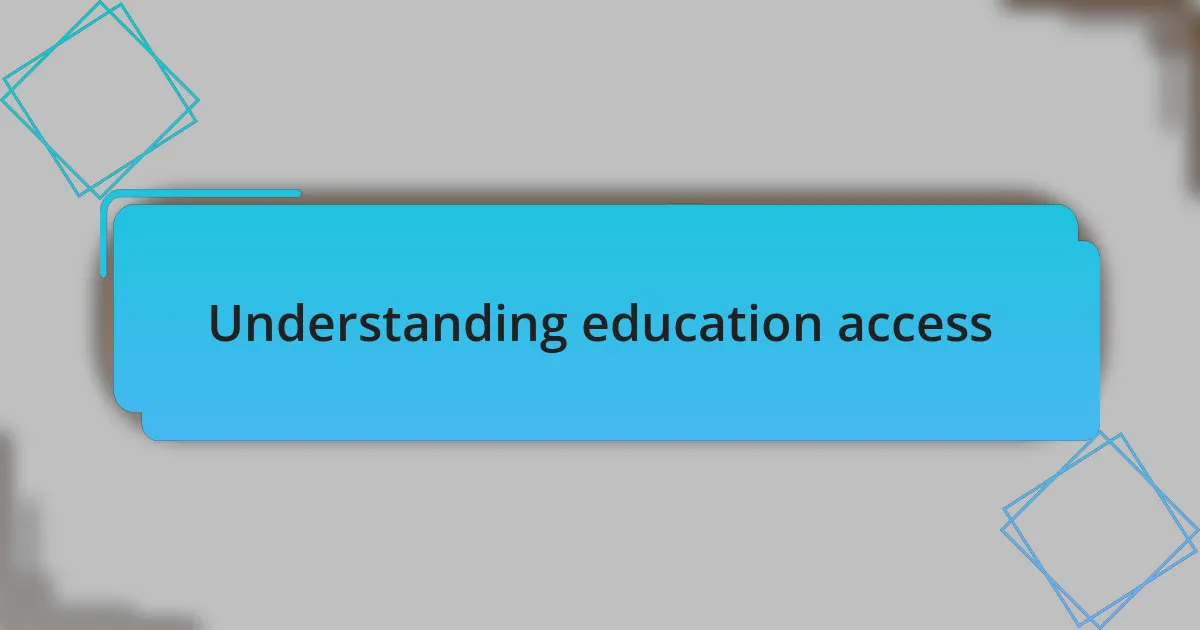
Understanding education access
Education access is a multifaceted issue that goes beyond mere availability of schools. I remember a time when a friend of mine faced immense challenges in securing a basic education due to systemic barriers. How can we expect young minds to thrive if they’re met with obstacles related to geography, socio-economic status, and even bureaucratic red tape?
Consider the emotional weight of the stories we often overlook. The frustration of a child unable to attend school because their family needs them to work is a stark reminder of the inequity in education access. Each child deserves a chance to learn and grow, yet many are left behind—doesn’t that make you question the integrity of our global education system?
Access also extends to the quality of education provided, which varies dramatically from one region to another. I once visited a rural school where enthusiastic teachers made the most of limited resources. It struck me how passion can mitigate scarcity, yet it also raised a crucial question: Why should dedicated educators have to fight for basic tools when every student deserves the same standard of learning?
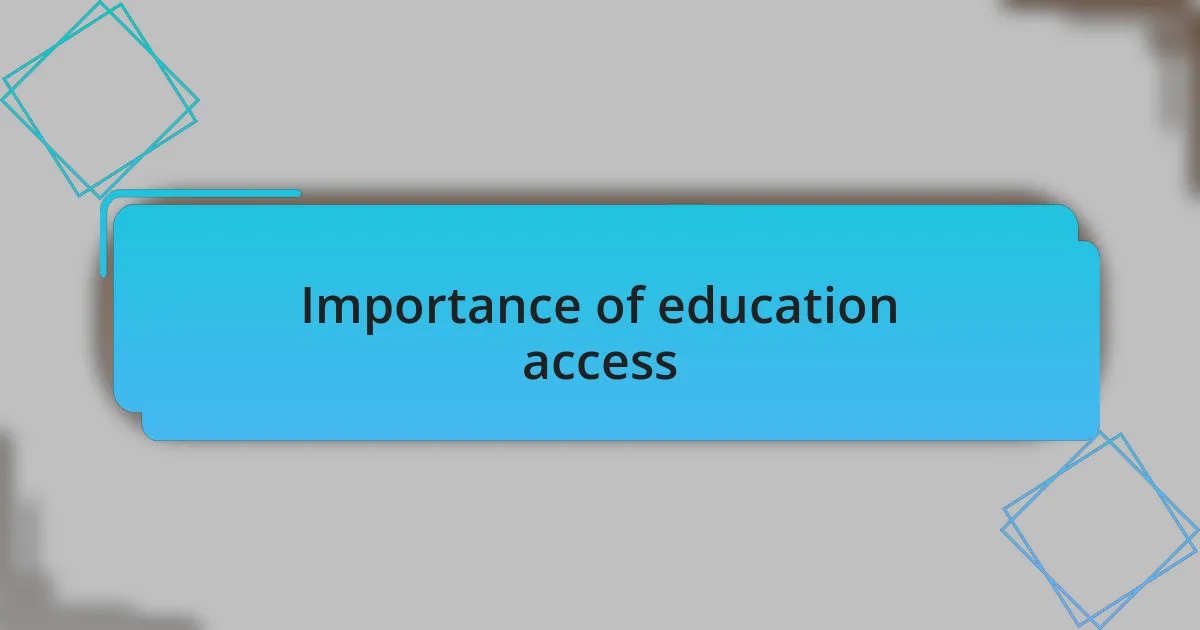
Importance of education access
Education access is critical because it lays the foundation for a just society. I vividly remember a mentoring program I participated in, where I met young students whose potential was hindered by lack of resources and support. Isn’t it heartbreaking to think that a child’s dreams can be stifled simply because they lack access to quality education?
Beyond personal stories, consider the broader implications. When individuals are educated, they can contribute positively to their communities, making informed decisions and fostering economic growth. I’ve seen this firsthand in urban centers that thrive when education becomes a priority—how can we not prioritize giving everyone the right tools for success?
Moreover, education access is intertwined with breaking the cycle of poverty. I once spoke with a young woman who shared that the moment she gained access to education, her entire outlook changed. She started envisioning a future that felt attainable for the first time. Don’t we all deserve that chance to envision a better tomorrow?
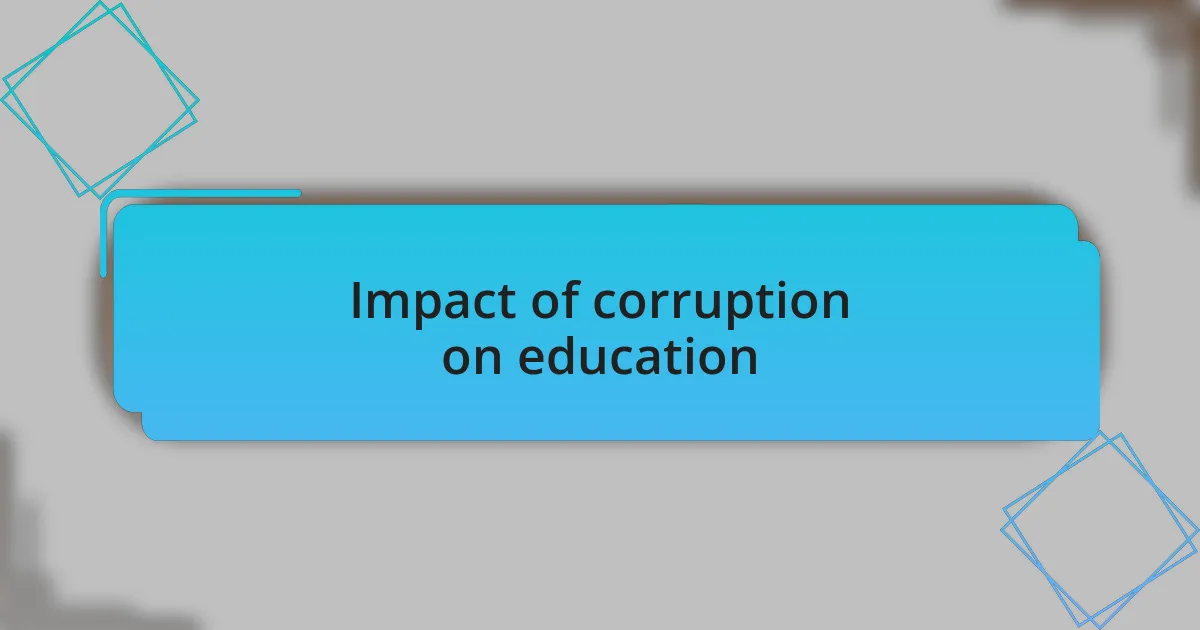
Impact of corruption on education
Corruption has a devastating effect on education systems worldwide. I recall visiting a school in a disadvantaged neighborhood where many of the promised resources never arrived due to embezzlement. Observing the teachers’ frustration and the children’s eagerness to learn amidst such deprivation made me realize how deep-seated corruption can rob future generations of their potential.
In many cases, corrupt practices lead to unequal access to educational opportunities. For instance, I remember a community leader sharing how funds earmarked for school improvements were siphoned off. This not only deprived students of better facilities but also fostered a sense of mistrust in government initiatives. How can we expect children to aspire to greatness when their environments are tainted by dishonesty?
Lastly, the impact of corruption can perpetuate cycles of inequality. I once met a student who was brilliant but trapped in a system where favoritism and bribery dictated admissions to better schools. This experience made it painfully clear to me that when corruption infiltrates education, it doesn’t just hurt individuals; it hampers national progress. Isn’t it crucial for us to advocate for a transparent system that prioritizes genuine access to education?
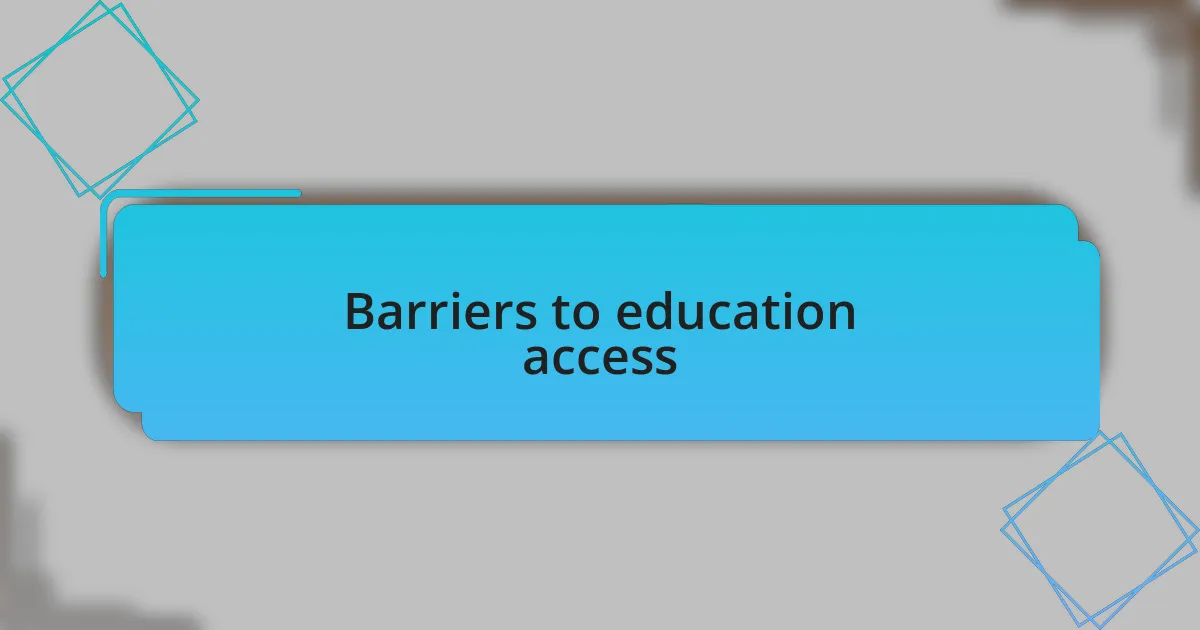
Barriers to education access
Barriers to education access often manifest in myriad forms, and I’ve seen firsthand how poverty directly limits opportunities for many children. I remember a neighbor’s daughter who had to drop out of school because her family couldn’t afford transportation fees. This heartbreaking choice highlighted just how insurmountable some financial obstacles can be, forcing talent to go untapped simply due to lack of resources.
Another significant barrier lies in the infrastructure itself. During my travels, I visited a rural community where the nearest school was over ten miles away. The long commute, often dangerous and daunting, discouraged families from sending their children, especially girls. How can we expect to cultivate a thriving generation of learners when physical access to educational institutions is so compromised?
Additionally, cultural norms can further inhibit education access. I encountered a family who prioritized their son’s education over their daughter’s, believing that investing in a girl’s schooling was unnecessary. This unequal treatment was disheartening, as I reflected on the potential that was being overlooked. Is it fair that a child’s future can be decided not by their abilities but by outdated societal beliefs? This kind of bias is a critical barrier we must challenge if we truly want to enhance educational equity.
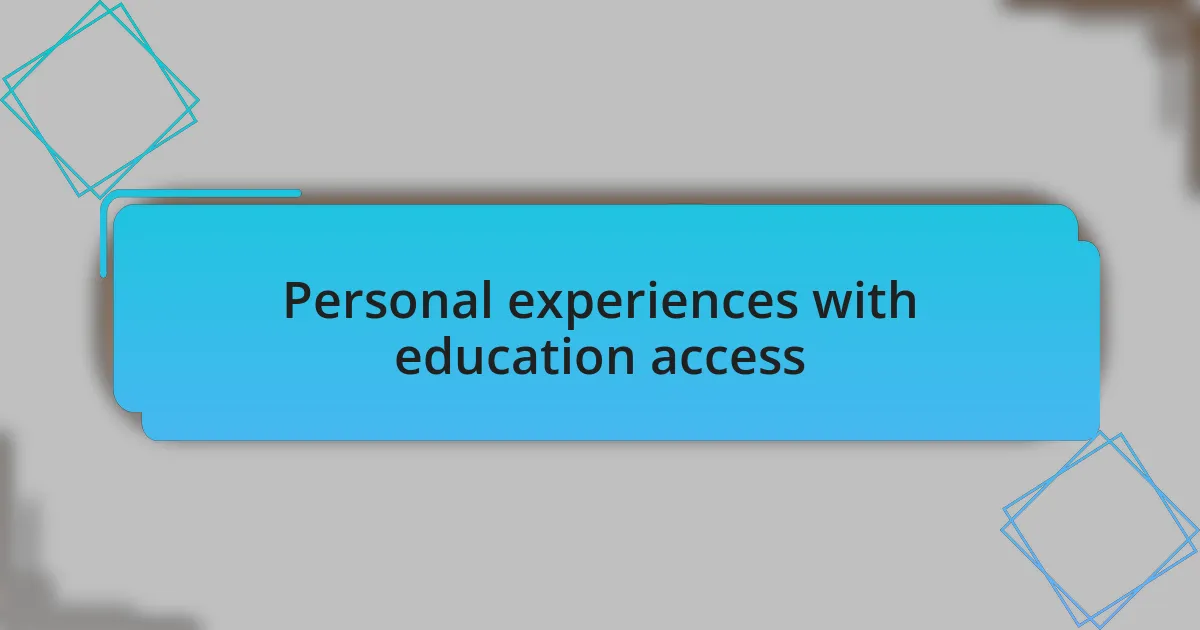
Personal experiences with education access
Growing up, I often witnessed the stark reality of education access in my hometown. A close friend of mine had a passion for science but had to settle for limited educational resources because her school lacked basic laboratory equipment. I still remember the spark in her eyes when she spoke about her dreams, yet the frustration of not having the tools to explore those dreams was palpable. Why should curiosity and ambition be stifled by such practical limitations?
I have also encountered the emotional toll that comes with these barriers. A mentor of mine shared her story about being encouraged to drop out to support her family’s financial needs. The weight of that decision stayed with her for years. It made me wonder: how many future leaders and innovators remain hidden, silenced by economic hardship? These narratives underscore a significant truth – our educational systems must evolve to break these cycles of despair.
There was a moment during a community workshop that struck a chord with me. One of the participants passionately discussed how cultural expectations prevented many girls from pursuing higher education. As she spoke, I could see the sadness mixed with determination on her face. Why should societal expectations dictate the limits of one’s potential? This experience reinforced my belief that until we address these deep-seated issues, we risk losing a wealth of knowledge and creativity that could be pivotal for our future.
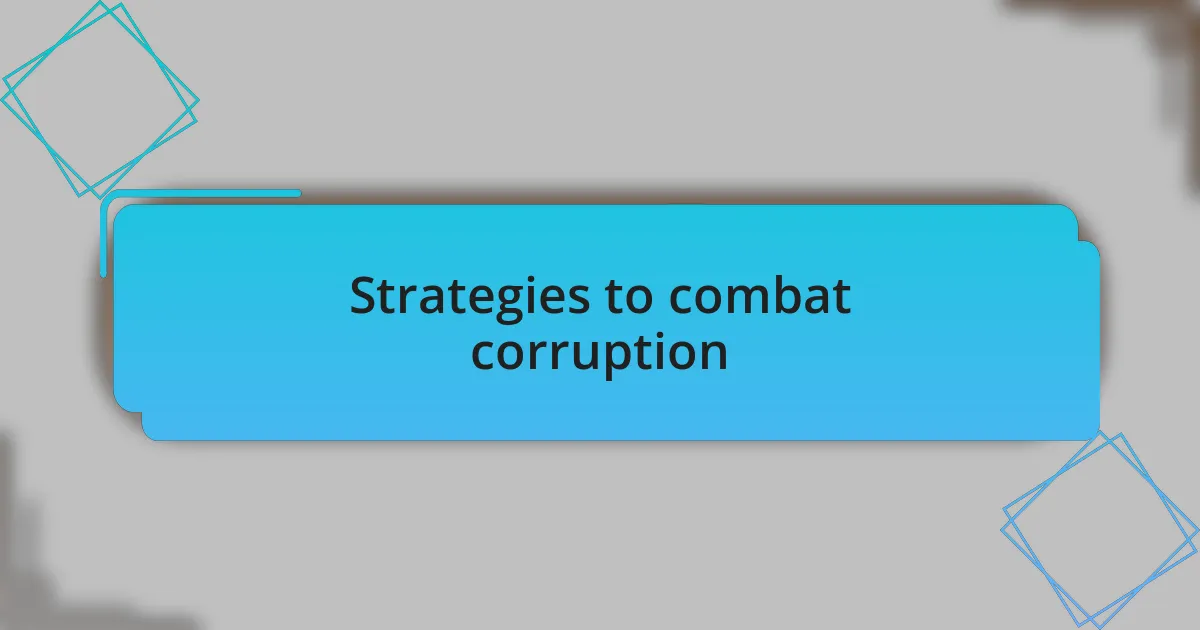
Strategies to combat corruption
One effective strategy to combat corruption in education is enhancing transparency in funding. I recall a project in our local school district where an open-budget initiative allowed community members to see exactly how funds were allocated. That increased scrutiny not only fostered trust but also ignited conversations about resource distribution that might have otherwise gone unheard. Isn’t it interesting how just shining a light on financial flows can discourage dishonest practices?
Another approach involves empowering whistleblowers within the education system. I once had a colleague who observed irregularities in the procurement process for educational materials. With proper channels to safely report such issues, he felt encouraged to speak up, knowing there were protections in place for him. It made me realize that creating a safe environment for reporting can lead to uncovering systemic problems before they escalate, ultimately preserving the integrity of education.
Lastly, fostering a culture of civic engagement and responsibility among students is vital. I remember leading a workshop where students role-played as policymakers, discussing educational reforms. Their eagerness to contribute ideas highlighted a crucial fact: when students understand their rights and the importance of accountability, they become proactive in demanding fairness. How powerful is it to think that educating the next generation on these issues can sow the seeds for lasting change?
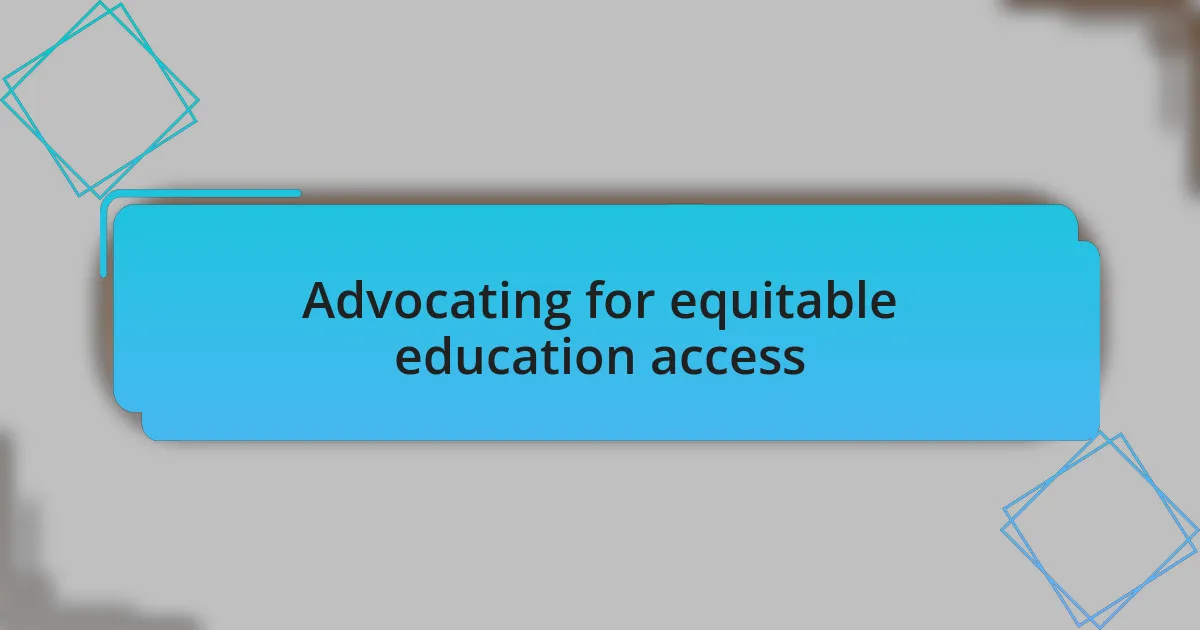
Advocating for equitable education access
Advocating for equitable education access often begins with recognizing the inherent inequalities that exist. When I volunteered at a tutoring program in an underserved neighborhood, I was struck by the stark contrast in resources between that community and more affluent areas. It made me acutely aware of how disparities in educational opportunities can shape a child’s future. How can we expect every student to succeed if the playing field isn’t level from the start?
Another angle I’ve found effective is community-driven initiatives. In one case, I participated in a grassroots effort to organize workshops for parents, where we discussed the significance of advocating for their children’s educational rights. The transformation in the parents’ mindset was palpable; they moved from feeling powerless to actively engaging with school administrators. Isn’t it remarkable how empowering individuals can dismantle barriers and foster a culture of advocacy?
Moreover, policies that ensure equitable access to technology in education are crucial. I remember the frustration of a close friend who struggled to complete her studies during the pandemic due to a lack of reliable internet access at home. Her experience illuminated the urgent need for universal access to digital resources. If technology is now a cornerstone of education, shouldn’t every student have the means to use it effectively? This realization fuels my passion for pushing for policy changes that prioritize inclusion and accessibility in our educational systems.